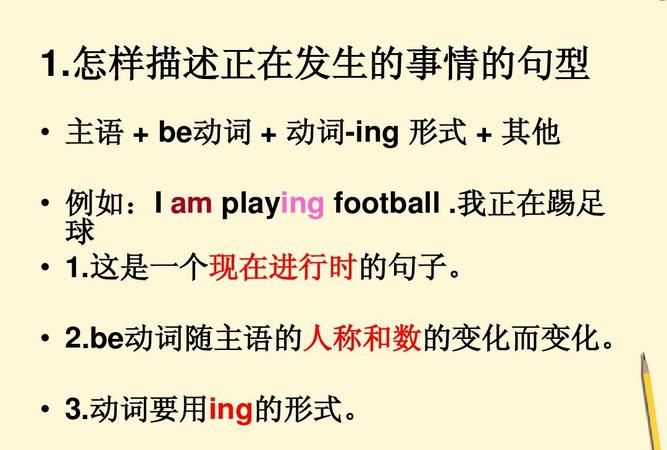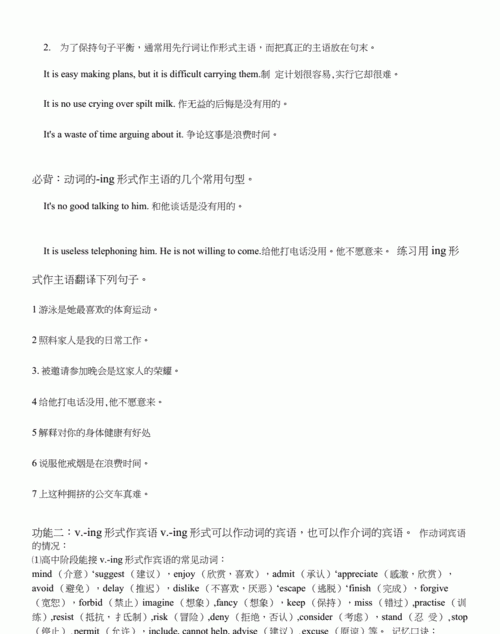本文目录
动名词做主语的句子例句
动名词做主语的句子:
1、Reading is an art.
2、Don't put your bike on the playground.

动名词(英语:gerund),指的是动词ing形式的一种,兼有动词和名词特征的非限定动词(即非谓语动词)。它可以支配宾语,也能被副词修饰,动名词有时态和语态的变化。动名词具有名词的性质,因此在句中可以充当主语、表语、宾语、定语,但是不能充当状语。
主语+be动词+动词ing+其他的句子
① I am doing my homework now. 我正在写作业。
② She is watching TV with her mother. 她正在和妈妈看电视呢。
③ They are cleaning the classroom. 他们正在打扫教室。
④ You are working on the farm, aren't you? 你在农场上干活呢,对不对?
⑤ He is swimming in the lake. 他在湖里游水呢。

动词ing做主语和宾语课件
1.现在分词的用法:
1) 做表语:
He was very amusing.
That book was rather boring.
很多动词的现在分词都可以作表语:
exciting, interesting, encouraging, disappointing, confusing, touching, puzzling.
2) 作定语:
上面所出现的现在分词都可以用作定语, 修饰一个名词:
That must have been a terrifying experience.
I found him a charming person.
现在分词短语还可以放在名词的后面修饰名词, 相当于一个定语从句:
There are a few boys swimming in the river.
There is a car waiting outside.
3) 作状语:
现在分词短语可以表示一个同时发生的次要的或伴随的动作:
Following Tom, we started to climb the mountain.
Opening the drawer, he took out a box.
Taking a key out of his pocket, he opened the door.
现在分词短语还可以表示原因, 相当于一个原因状语从句:
Not knowing her address, we couldn’t get in touch with her.
Being unemployed, he hasn’t got much money.
现在分词短语还可以表示时间, 相当于一个时间状语从句:
Hearing the news, they all jumped with joy.
Returning home, he began to do his homework.
Jim hurt his arm while playing tennis.
Be careful when crossing the road.
Having found a hotel, we looked for somewhere to have dinner.
Having finished her work, she went home.
4)作宾补:现在分词在一些动词之后可以做宾语的补语:
例如, see, hear, catch, find, keep , have 等.
I see him passing my house every day.
I caught him stealing things in that shop.
I smelt something burning.
She kept him working all day.
2.过去分词的用法:
1) 作表语:
We were so bored that we couldn’t help yawning.
She felt confused, and even frightened.
They were very pleased with the girl.
I’m satisfied with your answer.
He is not interested in research.
2) 作定语:
She has a pleased look on her face.
The teacher gave us a satisfied smile.
cooked food a written report
fried eggs boiled water
frozen food armed forces
required courses fallen leaves
finished products a forced smile
the risen sun new arrived visitors
What’s the language spoken in that country?
They’re problem left over by history.
The play put on by the teachers was a big success.
Is there anybody injured?
Do you know the number of books ordered?
3)作状语:
Seen from the hill, the city looks magnificent.
Given good health, I hope to finish the work this year.
They came in, followed by some children.
Depressed, he went to see his elder sister.
When treated with kindness, he was very amiable.
4)作宾补:过去分词也同样可以作宾语的补语, 接在某些动词后面
I will have the clothes washed tomorrow.
When they get back home, they found the room robbed.
希望对你有用

以ing形式开头的句子
以“ing”开头的句子,也就是动名词作主语,倾向于陈述一个既定事实。
Swimming is my favorite.游泳是我的最爱。
Getting up early is a good habit.早起是一种好习惯。

Drinking more water is good for our health.多喝水对我们的健康有益。
Reading in the sun is bad for eyes.在太阳底下看书对眼睛有害。
Seeing is believing.眼见为实。
以上就是关于十个ing做主语的句子 ,动名词做主语的句子例句的全部内容,以及十个ing做主语的句子 的相关内容,希望能够帮到您。

